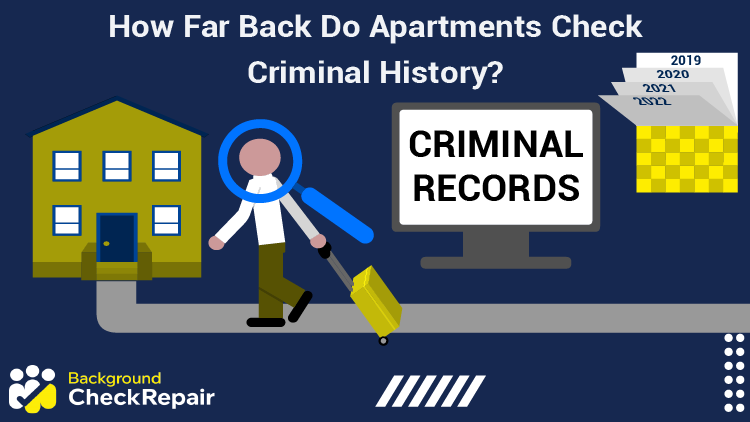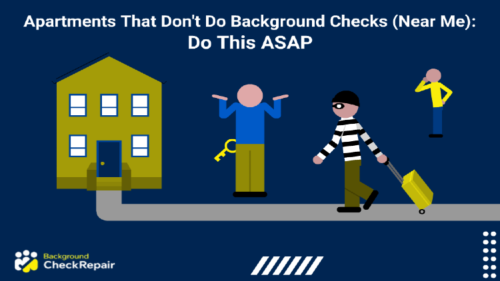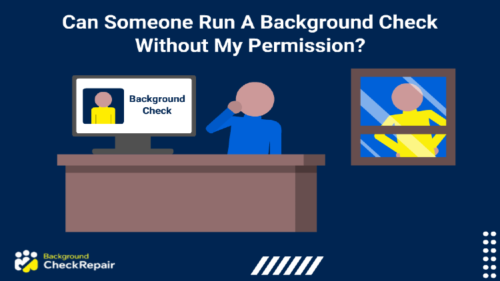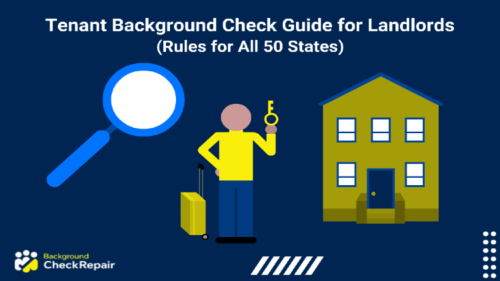
When applying for a new residence, many renters wonder how far back do apartments check criminal history?
Knowing what an apartment will look for before taking the time to apply can save everyone time. But, because each state is different, there’s no ‘one-size-fits-all” answer.
So, how far back do apartments check criminal history? Applicants can expect most tenant-related criminal history checks to go back 7-10 years, although there are several exceptions to this.
Because regarding what most apartment complexes look for, the background check will look at more information than just criminal history.
This comprehensive guide examines how far back an apartment check will search criminal records, as well as the other public (and private) information they’ll search once an applicant has signed the consent form.
How Far Back Do Apartments Check Criminal History?
When asking, how far back do apartments check criminal history, the first thing to consider is the location where the check is being conducted.
The majority of states do not have any limits as to how many years of criminal history can be examined when screening an individual for a tenant application. This means that individuals who have a criminal conviction from 20 years ago could hypothetically have their landlord access that information.
Applicants should perform a background check on themselves first, to ensure that all the public information available is correct.
However, there is good news as well.
Although rental companies and private individuals are legally allowed to go back forever in most cases, when it comes to how far back do apartment background checks go, most tenant background screening with social security number will only cover the last 7-10 years of criminal history and in some cases, it can be even less.
The reason for this has nothing to do with state laws and is mostly due to background check industry standards.
Even though landlords are technically able to perform background checks on tenant applicants themselves, navigating the various laws set by the FCRA can make this a time-consuming endeavor in which making a mistake can involve breaking federal law.1
Even though it can be done, most landlords will not see this effort to be worth their time and instead will hire a reputable background check agency to perform the check for them. The majority of background check agencies will only check the last 7-10 years of criminal history, even in states that do not have any limits regarding how far back a background check can go.
With that being said, for individuals hoping to find and rent an apartment with a built-in background check, as opposed to one that is performed manually by the landlord, it is generally a good idea to assume the check will go back forever.
However, before submitting any apartment applications that will involve a background check, it is always a good idea to read up on local tenant and background check laws and to run a background check on yourself.
The reason checking for local laws is so important is that several states and counties have begun to adopt laws that prevent landlords from being able to view an individual’s entire criminal history. For example, Colorado recently adopted a new law, the Rental Application Fairness Act that only allows landlords to look at the last 5 years of criminal history information starting with the day the application was submitted.2
Running a background check on yourself is equally important as it not only allows individuals to know exactly what kind of information the landlord will have access to but also gives individuals an opportunity to fix any mistakes that may appear on their background check.
In short, when it comes to how far back do apartments check criminal history, it’s usually a good idea to assume they will go back forever as in most states, they can.
How Far Back Do Apartments Check Criminal History? Tenant Background Checks
Tenant background screening is extremely common these days, mainly due to just how easy it has become to run background checks. A very common question amongst those who are worried about their criminal record impacting their ability to get an apartment is, do all apartments do background checks, and the answer is no.
There aren’t any laws that require landlords to perform background checks on potential tenants, however, the vast majority of them do. It is possible to find an apartment or rental property that does not perform background checks, but they are quite rare.
The best method to find apartments that don’t do background screening is to look for private landlords, as opposed to properties owned by large leasing companies. Properties owned by big leasing companies will almost always perform background checks on tenants whereas private landlords are more likely to simply want to meet the individual to get a feel for if the individual can be trusted.
Part of the confusion around tenant background checks is down to many individuals being surprised that they are a requirement at all. So, why do you need a background check when you rent an apartment? The answer is very similar to why employers perform background checks: To limit liabilities on their property.
If a tenant were to assault someone on the rental property, use the rental property to conduct illegal activities, or if the tenant badly damages the rental property, all of these things will cause the landlord to lose money.
Just like the credit check for apartments is used to ensure that the tenant can afford the apartment, the criminal history check is used to determine if the tenant is likely to commit a crime on the property, and the civil records check is used to determine if the tenant is likely to damage the property or violate the lease agreement in some way.
Another question individuals will have is, can the landlord reject your application based on your background check, and the answer is yes.
Although anti-discrimination laws will come into play a landlord is able to deny a rental application based on information that was uncovered during the background check.3
What Do They Look at During an Apartment Background Check?
The big question on many people’s minds when they are applying for apartments is what do they look at during an apartment background check, and the answer is quite simple.
Although it will vary from apartment to apartment, there are a few checks that individuals should always expect to find on an apartment background check.
What Do Apartment Background Checks Look For?
So, what do apartment background checks look for? Landlords are looking to answer three different questions with the background check:
- Is the renter able to pay for the apartment?
- Is the renter likely to commit a crime or create an unsafe environment?
- Is the renter likely to violate the lease agreement?
The required checks will look to answer these questions by examining various public records as well as the individual’s credit history.
What Does a Rental Background Check Consist Of?
At a minimum the following checks will be performed:
- Credit history check
- Income verification
- Criminal history check
- Civil court records check
First off, what do landlords look for in credit checks? The answer to this is very straightforward. Landlords will be looking to see if the individual is able to afford the rent on the property by checking their credit history to see if they are delinquent on any payments, especially if those delinquent payments involve a previous rental property.
Landlords will also be looking at the individual’s credit history to get a better idea of their financial situation.
This is also why both a credit check and income verification are important. Even if someone has the necessary income to afford the apartment, if they have significant debt and a low credit score, it could be an indication that they will not have very much money left for rent.
In regards to what would make someone fail a background check after a criminal history check, the answer will vary from property to property. Generally, the more serious the conviction, the less likely it will be overlooked.
Most notably sex crimes and crimes involving children will rarely be overlooked as it could create an unsafe environment for the other tenants of the property and their children. The same also applies to violent crimes as well as things like illegal drug manufacturing.4
Finally, civil court records are also checked to ensure the individual is not likely to violate the lease agreement. The reason that civil court records specifically are examined is that when an individual commits a serious lease violation, their landlord is likely to sue the individual for damages in civil court. Should this occur there will be court records that show the individual violated the lease agreement at their last apartment and their potential new landlord might see this as a major red flag.
What Is a Red Flag in a Background Check for a Rental
As far as what causes a red flag on a background check for an apartment, anything that indicates the individual might not pay their rent or negatively affect the rental property in some way will be scrutinized.
Remember, not every red flag will be a disqualifier so it’s important to communicate with the landlord in case they have questions about information uncovered in the background check.
When it comes to how to rent an apartment with a felony on your record, the best thing to do is, to be honest with the landlord about the circumstances of the charges. A landlord-tenant relationship is built on trust so being open with the landlord will give you the best chance of having the application approved.
How Far Back Do They Check Rental History on an Apartment Background Check?
In most cases, the laws surrounding how far back a background check can go for an apartment applies to both the criminal history and the rental history. However, there is no database that would even allow a landlord to check for rental history as this information is supplied by the applicant. Landlords do not expect individuals to be able to remember their last 20 years of rentals so most only ask for the previous 5 – 10 years of rental history.
The main cause for concern that leads individuals to ask questions about rental history checks is because they are concerned about an eviction affecting their chances of renting. So, does eviction appear on the background screening record?
An eviction will only appear on a background check if the eviction was officially filed through a civil court. In many cases, individuals use the term eviction to refer to a situation in which the landlord asked someone to vacate the premises.
Although this is a part of the eviction proceedings, an actual eviction is a fairly long legal process that involves the courts. Basically, as long as the courts were not involved, then there should be no record of the eviction.
How Far Back Do Apartments Check Criminal History in Each State?
When it comes to background checks and your rights, it is extremely important that individuals know the local tenant and background check laws.
This is especially true when it comes to how far back do apartments check criminal history, even in states that have limited time frames, it is illegal for a landlord to run a private background check on the individual without their consent.
If a background check is used for official purposes then the individual running the check must obtain the written consent of the individual for the check, otherwise using the information found to make an official decision, such as to deny someone a lease, is illegal per the FCRA.1
Furthermore, landlords using the individual’s SSN without their consent constitutes identity theft, which is a federal offense.5
How To Do Background Check for Renters: How To Do a Credit Check on a Tenant
Navigating how to do tenant background checks can be somewhat difficult. There are a lot of laws and regulations that need to be aware of if they are going to do the check themselves. For this reason, most landlords will employ the use of a private background check service to do the checks for them.
Performing a credit check on a tenant is fairly easy. The most important thing to do is to obtain the tenant’s written consent to perform the check to avoid committing identity theft. Besides this, individuals can run a credit check using the applicant’s name and SSN.6
Although it can be done independently, many of those asking how to check someone’s credit for renting will decide to go with a private service to run the check for them to avoid violating any FCRA laws.
How Much Does a Background Check Cost?
Background check costs vary widely from company to company. For landlords, it is essential for regulations. Checks are often paid for via monthly subscriptions, however, in the case of single checks, they can cost anywhere from $10 to $300 depending on the company and a variety of other factors.
How To Pass an Apartment Background Check
When it comes to passing an apartment background check, the best thing to do is to perform a background check on yourself beforehand so you can be aware of exactly what is going to show up on your check and get a chance to fix any mistakes that are on your record.
So, how do I get a free rental background screening on myself? This can be done by using the search bar at the top of this page to perform a free public records check on yourself.
There are also numerous online background check services that individuals can use. Many of these will require that the user pays for a month-long subscription, but there is often a 7-day free trial background check available.
Individuals should always take care to learn the local tenant and background check laws before applying for an apartment. This is especially important when applying for apartments owned by private landlords as they are more likely to unknowingly break tenant laws.
So, when asking, how far back do apartments check criminal history, know that the answer varies but individuals should always prepare for their entire criminal history to be examined.
Frequently Asked Questions About How Far Back Do Apartments Check Criminal History





